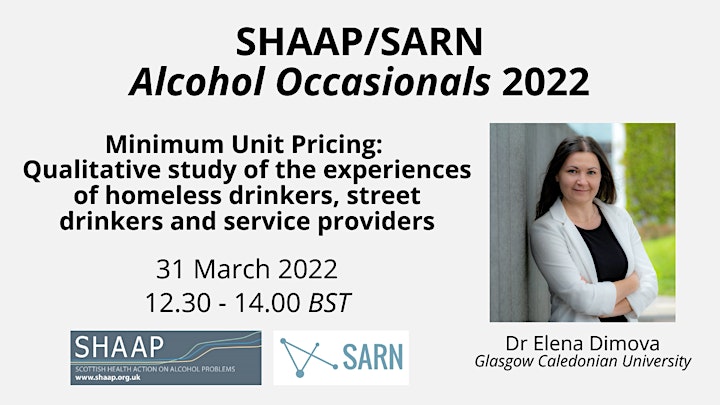
Scottish Health Action on Alcohol Problems (SHAAP) and the Scottish Alcohol Research Network (SARN) invite you to join us online on Thursday 31 March from 12.30-14.00 BST (UK time) for our first SHAAP/SARN Alcohol Occasionals event of 2022.
Dr Elena Dimova (Glasgow Caledonian University) will present her research “Minimum Unit Pricing: Qualitative Study of the Experiences of Homeless Drinkers, Street Drinkers and Service Providers” and we will then open to Q+A and wider discussion.
Dr Elena Dimova is a Research Fellow in the Substance Use research group (@SubMisuseGcu) at Glasgow Caledonian University. She is also a Chartered member of the British Psychological Society. Her research focuses on reducing alcohol-related harm in different groups (e.g. new fathers, LGBTQ+ people, homeless people). She has methodological expertise in qualitative research and conducting systematic, scoping and rapid reviews. Her Twitter handle is @ElenaDDimova.
The webinar will be hosted online using Zoom, and registrants will receive a link to join.
Alcohol Occasionals are free to attend and open to all, and our audience is diverse, including academics/researchers, healthcare professionals, policy-makers and members of the public.
Register for free now!

Background: Alcohol Minimum Unit Pricing (MUP) was introduced in Scotland in May 2018. Existing evidence suggests MUP can reduce drinking in the general population, but there is little evidence regarding its impact on vulnerable groups. This qualitative study aimed to capture the experiences of MUP among homeless drinkers, street drinkers, and the support services that work with them.
Methods: We conducted qualitative interviews with 46 people with current or recent experience of homelessness or street drinking and 41 service providers and other professionals working with this population across Scotland. Stakeholder group meetings were conducted throughout the study. Data were analysed using Thematic Analysis and Framework Approach.
Results: Homeless and street drinker respondents were aware of MUP but it was accorded low priority in their hierarchy of multiple concerns. Reported impacts on the quantity and type of alcohol consumed varied. Some individuals reduced their drinking, some were unaffected, some switched drinks, and for some the balance of alcohol vis-à-vis drugs consumed shifted toward the latter. MUP had negligible impact on services that work with homeless and street drinkers. Most service provider interviewees reported feeling insufficiently prepared prior to its implementation, and only a few had supported staff to initiate conversations with service users about the policy’s potential implications. Opportunities to use the introduction of MUP to promote service users’ engagement with harm reduction and/or treatment were therefore missed.
Conclusion: Policy makers in Scotland need to devise mitigations for the unintended outcomes affecting a minority of homeless and street drinkers. Other countries considering MUP should support stakeholders prior to implementation to exploit potential benefits as well as mitigate unintended consequences.
Funding: Chief Scientist Office (CSO)
Conflict of interest: None
Study team: Lawrie Elliott (co-lead), Carol Emslie (co-lead), Elena Dimova, Martin Whiteford, Rosaleen O’Brien, Heather Strachan (Glasgow Caledonian University), Sarah Johnsen (Heriot-Watt University), Robert Rush (Independent Consultant), Iain Smith (NHS Forth Valley), Tim Stockwell (Canadian Institute for Substance Use Research, University of Victoria), Anne Whittaker (University of Stirling). Partner: Homeless Network Scotland.
